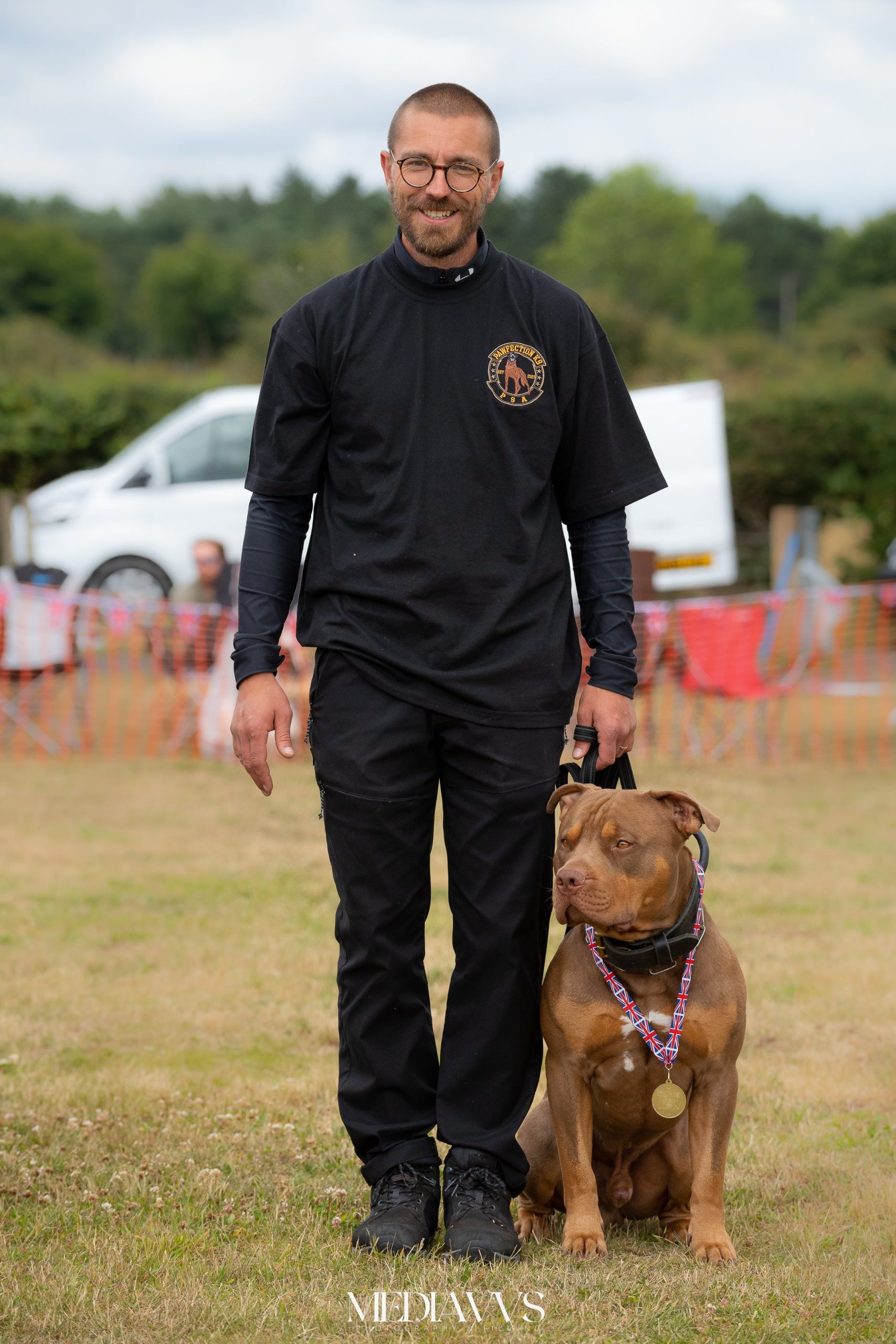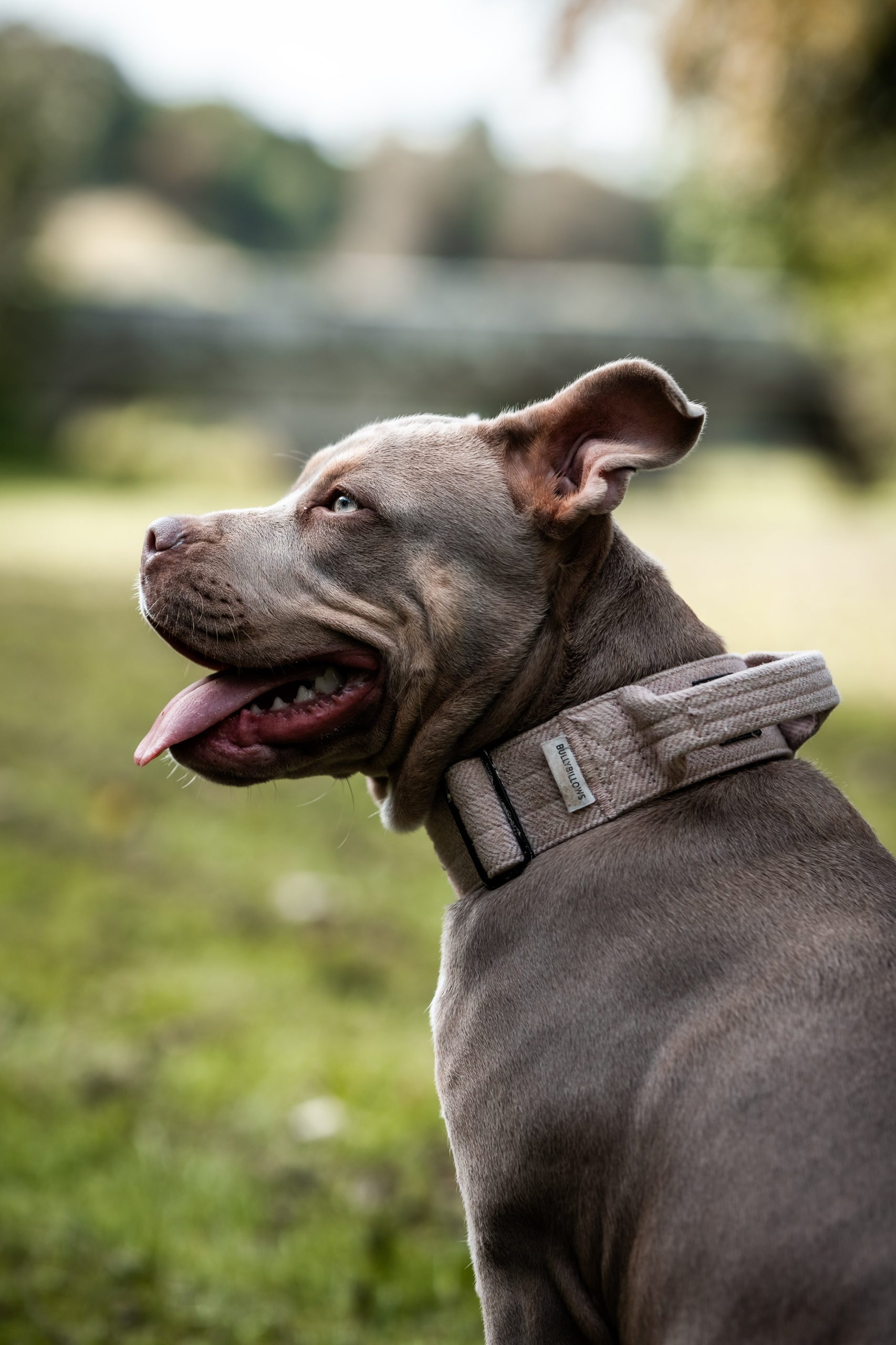
They’ve never ever done anything wrong,” one woman says of her three XL bully dogs. “We’ve owned bull breeds for 10 years and they’ve never put a foot wrong, we’ve never had altercations in public, we have had nothing but a positive experience.”
Heather Halls and her husband Chris have spent the past few weeks in disbelief after Rishi Sunak announced in September that American XL bully dogs would be banned in the UK following a spate of high-profile attacks and fatalities.
Not only do three of their family dogs fall into this category, but Chris is a professional dog trainer specialising in bulldog breeds, meaning that their entire livelihood is now at stake. They also compete in the Protection Sports Association, by which two of their XL bullies have been awarded titles.

“Essentially, our whole world and what we’ve worked towards in the last few years is about to get flipped on its head,” says Heather.
The couple have now joined forces with other XL bully owners to launch an official campaign to challenge the government’s stance, with more than £86,000 raised in a matter of days to support legal action.
Campaigners from Don’t Ban Me – Licence Me are asking the Department for the Environment, Food and Rural Affairs (Defra) to rethink their plans and are fundraising for a judicial review.
Poor breeding to blame for XL bullies attacking people, says dog trainer
With the support of their barrister John Cooper KC, they sent a warning of their intention to launch legal action to the environment secretary Therese Coffey last Thursday, as they hope to scrap the planned ban in favour of tightened laws around breeding and ownership.
Under new legislation, it will be illegal to sell, breed or abandon an XL bully-type dog from 31 December, while it will be an offence to own one from 1 February 2024 unless it is registered to the government’s database, the Index of Exempted Dogs.

Once their animal is registered, owners will have to abide by strict regulations, which include keeping their dogs muzzled and on a lead at all times in public, having them neutered and microchipped, and having to carry a certificate of exemption at all times to show police officers or council dog wardens.
Alongside descriptions of head size and physical features, the government has defined an American XL bully as an adult male from 20in in height, or an adult female from 19in. However, given that XL bullies have never been defined as an official breed, this has confused owners of cross-breeds such as mastiffs and mongrels.
The decision to ban the breed came after deaths relating to XL bully attacks, including those of 10-year-old Jack Lis and 17-month-old Bella-Rae Birch. Two people were injured in recent days in Mansfield by a suspected XL bully, while one report holds the breed responsible for nearly 50 per cent of all dog attacks in the UK.
Charities with the banned breed in their care will now receive £100 compensation for euthanising an XL bully, while owners will get £200 compensation if a vet euthanises their dog.

Speaking to The Independent, Sophie Coulthard, an organiser of the campaign group, says: “The problem with this knee-jerk reaction is that it won’t stop dog attacks. We need to focus on licensing and educating owners, with compulsory training and tougher punishments to prevent people from impulse-buying dogs.”
Sophie has owned her XL bully, Billy, for the last year, and has developed a following on TikTok by posting educational videos of his training as well as details of the proposed ban.
“One thing we’ve found is that people are really misinformed on the full impact of the ban,” she says. “What the government is asking me to do is look at their guidelines and commit him to a life on the muzzle, not go on holidays with him, have him muzzled in the car.
“There’d be no more playing with a toy in the park, anyone in social housing could lose their housing or their dog, you can no longer hire private fields to take dogs off the lead. It is really reducing the quality of life for these dogs.”
The group is arguing for the UK to take a similar approach to Canada’s Calgary model, an educational, licensing and stronger enforcement programme that has successfully reduced the number of dog bites by 70 per cent.

“I understand there’s been attacks, and I fully sympathise with anyone who has been a victim, because it’s horrific,” Heather says. “Dog ownership is a complete and utter mess, and people got these dogs in lockdown and haven’t socialised them or trained them. My son was bitten by a dachshund that shot out of a front door, so it’s not just XL bullies.
“Licensing is the right way forward. It’s proven to work in other countries and you can’t ignore the evidence that it works.”
Since the announcement, her five-year-old son panics each time he hears a siren, out of fear that police officers will arrive to take his dogs away. “Our dogs are our family pets,” says Heather. “I’ll do anything to keep my dogs safe. I will fight with my last breath.”
A lot of people had a crush on her in the 1980s, but look at her now…

After her breakout role in “Crocodile Dundee”, Linda Kozlowski found herself thrust into the international spotlight. Starring opposite Paul Hogan, the film marked a significant milestone in her career trajectory. However, following the “Dundee” series and a handful of other projects, Kozlowski gradually veered away from the glitz and glamor of Hollywood.
Hailing from Fairfield, Connecticut, Linda Kozlowski was born on January 7, 1958, with aspirations of treading the boards. She pursued her passion for acting by enrolling in the prestigious theater program at the Juilliard School. Upon graduating in 1981, she made her mark in various off-Broadway productions before transitioning to minor roles on Broadway and television. Notably, she starred alongside Dustin Hoffman in the television movie “Death of a Salesman”, marking a significant milestone in her career.

Linda’s path to fame wasn’t without its hurdles. Following her stint as a waitress post-“Death of a Salesman”, she relocated to California. It was there, under the wing of her mentor Dustin Hoffman and his wife, that Linda found refuge in their Malibu beach house. It was from this humble abode that Linda embarked on an audition that would alter the course of her life.

Dustin Hoffman’s endorsement landed Linda the coveted role of Sue Charlton in “Crocodile Dundee”, a character she portrayed with aplomb. The film’s astronomical success, raking in over $320 million against a $10 million budget, catapulted Linda Kozlowski into stardom virtually overnight. Interestingly, her fame initially soared in Australia due to the film’s early release there.

Despite her newfound celebrity status, Linda felt somewhat overlooked in Hollywood. While she reprised her role in the “Crocodile Dundee” sequels, she declined numerous offers for roles that pigeonholed her as the quintessential girlfriend of a comedic lead. Ultimately, Linda decided to bid adieu to acting after the third installment of “Dundee”.

In her personal life, Linda Kozlowski found love on set with her co-star Paul Hogan during the “Crocodile Dundee” series. They tied the knot in 1990 and welcomed their son, Chance, in 1998. However, their marriage dissolved in 2014. Following her divorce from Paul Hogan, Linda received a substantial settlement, empowering her to chart her own course. She turned her gaze towards Morocco, where she crossed paths with Moulay Hafid Baba, a native tour guide, sparking a profound life transformation.

Together, Linda and Moulay Hafid Baba founded the luxury travel agency Dream My Destiny in Marrakech. Crafting bespoke travel experiences tailored to their clients’ desires became their passion. Linda seamlessly transitioned from the glitz of Hollywood to the enchanting vistas of Morocco.

While Linda Kozlowski may have bid farewell to the silver screen, her legacy as Sue Charlton in “Crocodile Dundee” endures. At 63, she embraces her adventurous spirit and finds fulfillment in her new life in Morocco. She believes that reality surpasses fiction, channeling her intuition honed during her acting career into curating unforgettable experiences for travelers around the globe.



Leave a Reply